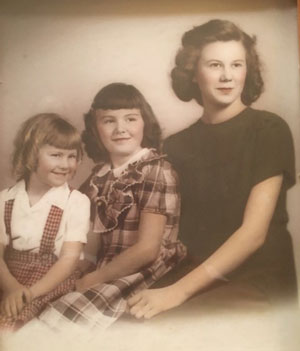
Dr. Perky Beisel, Public History Professor at Stephen F. Austin University, introduced me to a wonderful, oral history project she and others created several years ago. It is exceptionally useful for small communities with elderly populations.
Over the Labor Day holiday, I had the privilege of attending an example, completely unplanned but very successful. The eighty-five-year-old matriarch and her two younger sisters regaled relatives with wonderful stories of their childhood. Present were the two widowed sisters and the youngest sister with her husband of more than fifty years. The honoree has three children, two sons and one daughter who has two children and four grandchildren. She and her brood of children played games while their elders reminisced.
The youngest of the sisters and her husband came in from Lubbock, but their children and families lived too far away to come with school starting. The middle sister was there with her two children but again, grandchildren and great-grandchildren had other activities. I really think the younger family members are bored with all these memories. It takes someone interested in the past to listen to the fascinating stories.
After a huge lunch of fried chicken and numerous desserts, including a delicious coconut pie, the party moved to the back porch where fans worked up a good breeze. That’s when the story-telling began. The extended family consisted of members who have worked at farming, in industries, secretarial work, and teaching. One son is a professional businessman but did lots of farm work as a youngster and is still piddling with the cattle business.
I have been researching Southern history after the Civil War. One of my sources is The Mind of the South by W. J. Cash. Published in 1940, the book is still relevant about the pre-World War II era. His insight into the Great Depression is tremendous. And these women, the children of a tenant farmer and his wife, were well aware of hard-times farming cotton. Seldom do they talk about that part of their lives, but on that Sunday afternoon, with the three together, they opened up.
One story I had never heard was paying the monthly bill at the store. I am knowledgeable about furnishing merchants or credit stores in existence from the Civil War to World War II. In some places the custom continued into the 1950s. But it seems the girls’ father was somewhat of a reprobate, and quite contrary at times. Every time the monthly bill arrived, the girls and their mother had to stand while he went over the bill and fussed about their extravagances. That is until the middle daughter tallied up what they spent and compared it with livestock and farm expenses along with cans of Prince Albert tobacco. She went into banking as an adult.
Before the War, the family moved two or three times to other farms. The matriarch told about often not finishing the school year without moving. The middle daughter had stories about milking the family cow and having the tail hit her in the face at least once at every milking.
After the War, the family moved to Merit. The matriarch married soon after. She and her husband had the first grandchild, an energetic and smart boy who inherited some of his grandfather’s traits. One day, he told his grandmother he was going to the store. Later the grandfather came home and wanted to know where the boy was. His wife forgot he went to the store. The whole town was called out to help locate the child. A pond behind the house was dragged. Everybody but the boy and his uncle were frantic. Those two were in the store laughing at all the commotion until someone ran into the store. The story stopped there. Did the boy get hugs and kisses or a good spanking? He never says when he tells that story.
